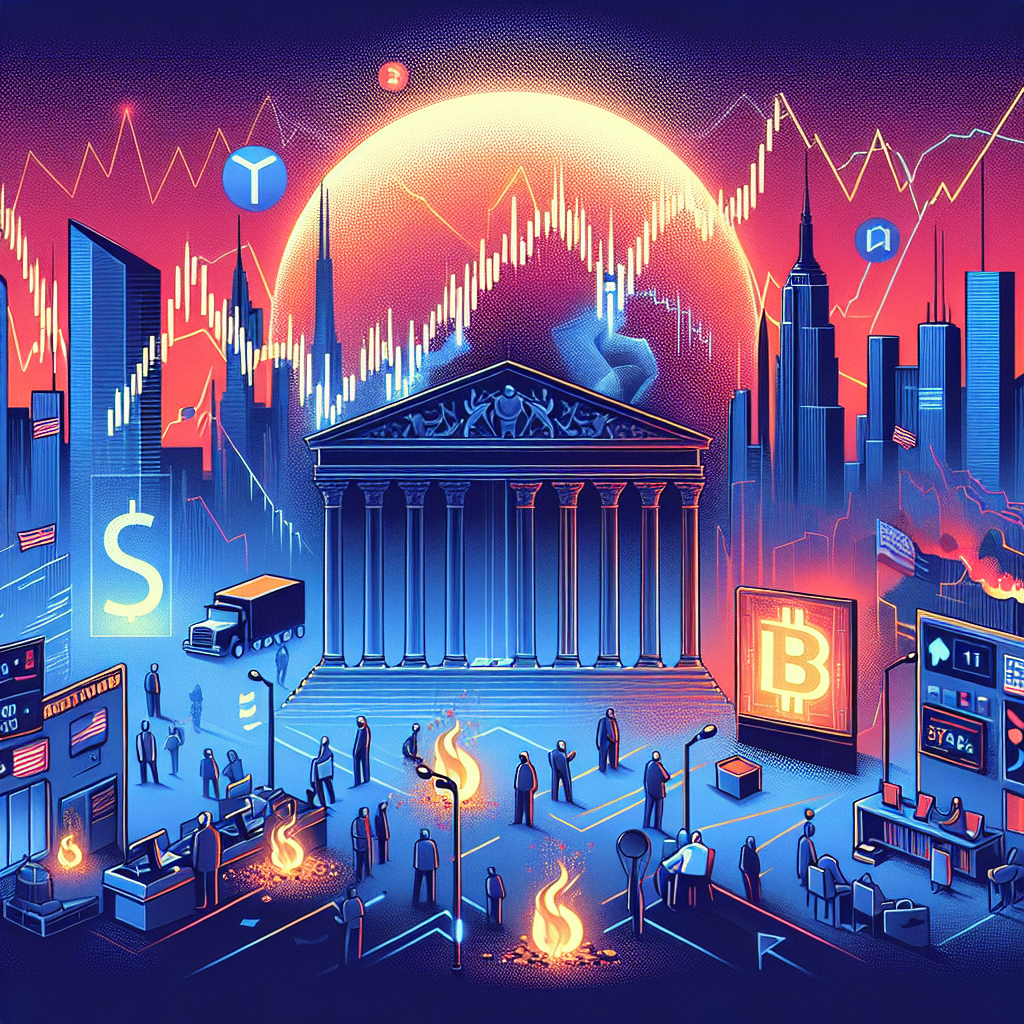Bitcoin
U.S. Stock Market Faces Historic Crash Over Trump’s Tariff War: What This Means for Investors

The United States stock market is grappling with significant volatility as fears surrounding a potential recession intensify due to President Donald Trump’s ongoing trade war. As of April 7, 2025, the market witnessed a staggering loss of approximately $2.2 trillion in value, with major indexes, including the Dow Jones, S&P 500, and Nasdaq Composite, facing severe declines. This downturn has triggered widespread concern among investors about the long-term implications for the economy.
Current financial analysts are questioning whether President Trump will pivot from his stringent tariff policies to mitigate further market deterioration. The steep declines across major indices, most notably a fall of about 4% in the S&P 500, indicate that investors are losing faith amid rising uncertainty surrounding trade relations, particularly with China. The heightened tariffs being imposed by both nations have intensified global recession fears, overshadowing prior market optimism.
The ramifications of these policies were starkly evident during the tumultuous trading day; nearly all gains accrued over the past year were erased. Investors now fear that the exacerbation of the U.S.-China trade conflict, particularly after China’s retaliatory tariff increase to 34% on American goods, could lead to a prolonged economic downturn.
Influential financial voices such as economist Peter Schiff have raised red flags about the current economic climate. Schiff cautions that the market is inadequately accounting for the nearing possibility of a recession and claims that valuations remain inflated. He forecasts a potential market collapse akin to the severity of the Great Depression, suggesting that a market drop of 50% might not accurately reflect the gravity of ongoing economic issues. Schiff has also predicted substantial declines in cryptocurrency values, speculating that Ethereum could dip below $1,000 amid these market tensions.
Similarly, billionaire investor Bill Ackman has expressed grave concerns regarding the trade war, labeling it a “self-imposed economic winter.” He attributes much of the current turmoil to the administration’s provocative stance, urging Trump to reconsider the ongoing tariffs. Ackman posits that such measures are causing damage to the economy that might only escalate if a ceasefire in trade hostilities isn’t declared soon.
Adding to the chorus of warnings, Robert Kiyosaki, known for his book “Rich Dad Poor Dad,” has posited that the stock market’s crisis is a prelude to something graver. He emphasizes that as the market trends downward, there exists a risk of a total collapse of overvalued assets, including stocks and bonds. Kiyosaki advocates for a diversified investment strategy into precious metals like gold and silver, as well as Bitcoin, which he considers safe havens from the impending financial turmoil. He further remarks that rampant inflation and excessive money printing threaten the U.S. dollar’s stability and contribute to the mounting fears of an economic crisis.
As the stock market wrestles with these challenges, speculation grows as to whether Trump may reconsider his approach to tariffs. The substantial losses experienced in both the U.S. market and the global economy raise questions about his steadfastness in maintaining current trade policies. While critics urge for a strategic recalibration, Trump has remained resolute in asserting that tariffs are essential for rectifying long-standing trade injustices. In remarks, the president indicated that should China fail to retract its 34% retaliatory tariffs, the U.S. would consider imposing an additional 50% tariff on Chinese products. This hardline strategy has heightened concerns about an escalated trade conflict, potentially resulting in further instability for the global economy.
Prominent investors such as Ackman and Schiff have advocated for a reassessment of tariff policies, highlighting the significant harm they are inflicting on the economy. They contend that the continuation of these tariffs could lead to more dire consequences for both markets and the general populace. Schiff asserts that present market conditions may merely be the tip of the iceberg regarding the impending recession.
With market drops continuing and anxiety surrounding economic stability escalating, indicators suggest that the administration may need to adjust its trade tactics to avert further financial risks. Investors and economists alike await signals from the White House that could suggest a shift in tariff strategy, as stakeholders remain watchful of the unfolding crises.
-

 Press Releases2 years ago
Press Releases2 years agoGaming Technologies of the New Time!
-

 Altcoins11 months ago
Altcoins11 months agoBitcoin Declines Below $80K: deVere CEO Nigel Green Remains Bullish on Long-Term Outlook Following Strategic U.S. Bitcoin Reserve Announcement
-

 Altcoins11 months ago
Altcoins11 months agoCalls for Enhanced Discussion on Bitcoin as Brazil’s Reserve Asset: A Move Towards ‘Internet’s Gold’
-

 Bitcoin1 year ago
Bitcoin1 year agoBitcoin Surges Past $64K as SEI and POPCAT Lead Daily Crypto Gains on September 25
-

 Press Releases2 years ago
Press Releases2 years agoEvo Exchange: Redefining the Decentralized Exchange Landscape
-

 Bitcoin7 months ago
Bitcoin7 months agoGrayscale Investments Submits Draft Registration for IPO, Aiming for Public Trading in U.S.
-

 Press Releases1 year ago
Press Releases1 year agoCODE, a Newly Born Project Brings Decentralization Back to the Main Menu
-

 Bitcoin7 months ago
Bitcoin7 months agoPeter Schiff Critiques New Crypto Legislation, Claims Bitcoin (BTC) Gains are Short-Lived




